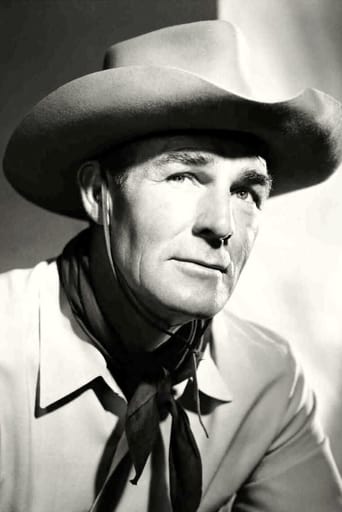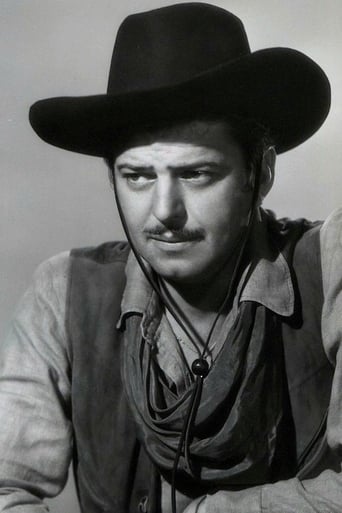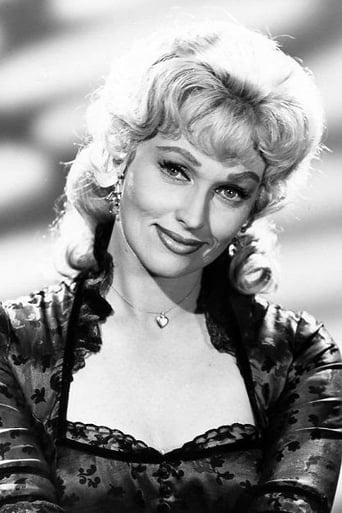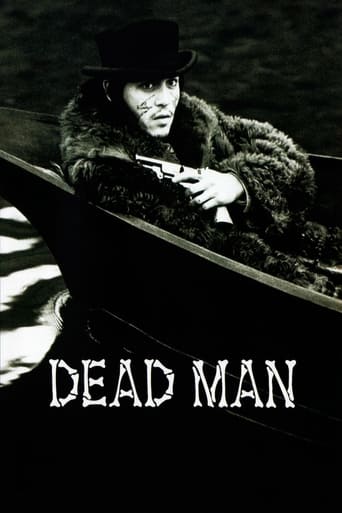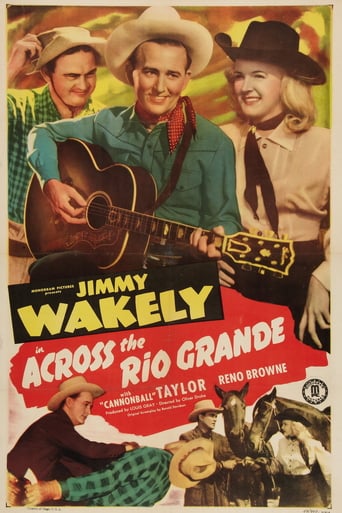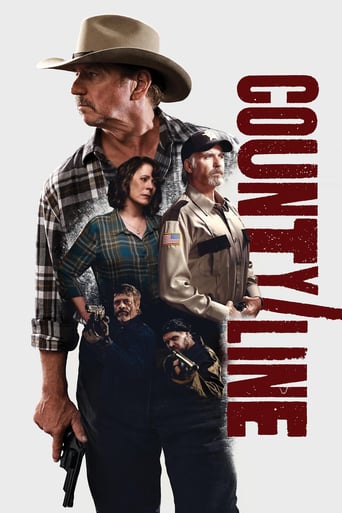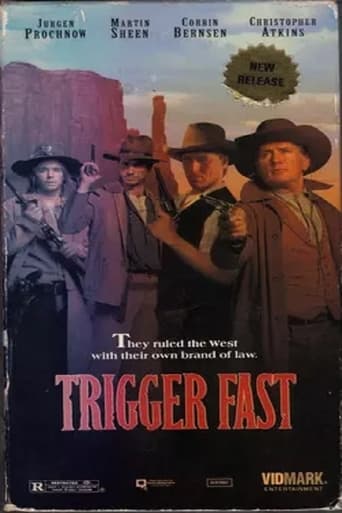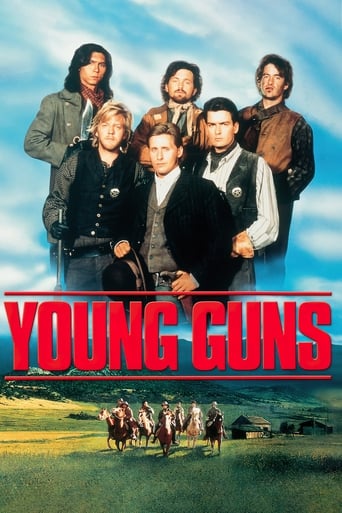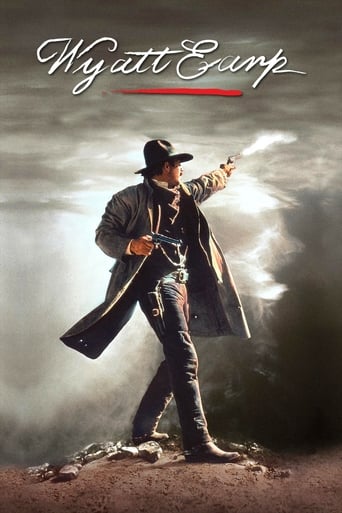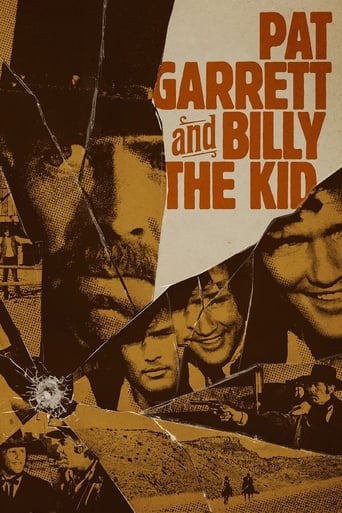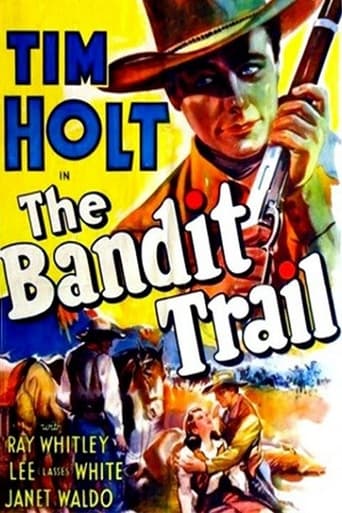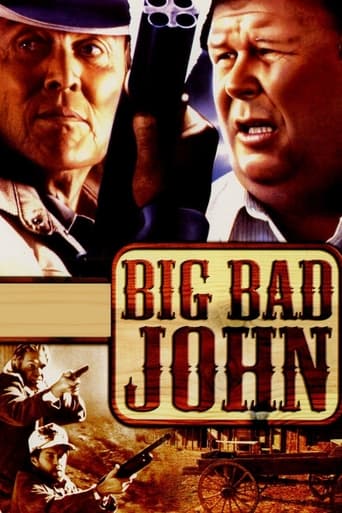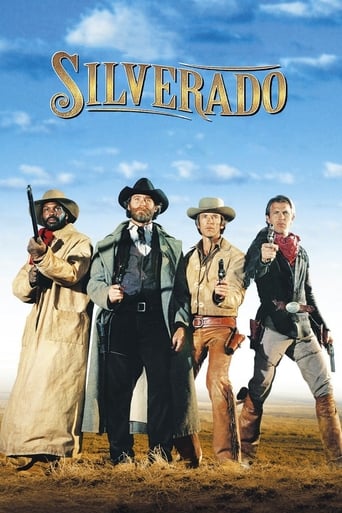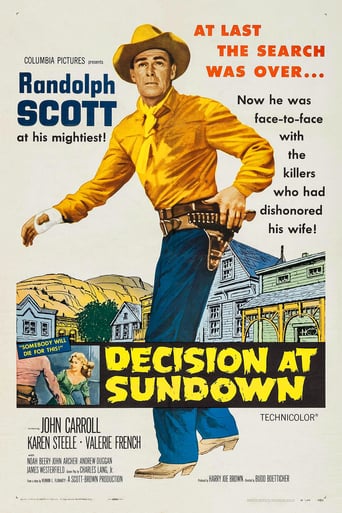
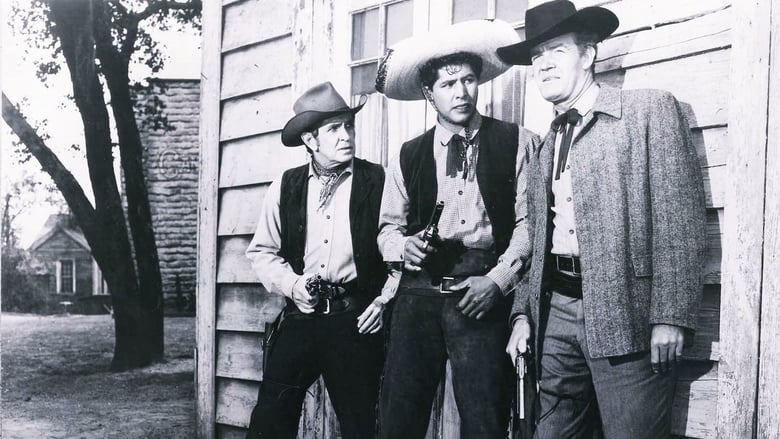
Decision at Sundown (1957)
A man and his partner arrive at a small Western town to kill its most powerful man because the former blames him for his wife's death.
Watch Trailer
Cast


Similar titles
Reviews
"Decision at Sundown" marked the third of seven collaborations between star Randolph Scott and famed director Budd Boetticher. In this one Scott plays Bart Allison a grim hate filled revengeful hombre with little in the way of redeeming qualities.Allison and his partner Sam (Noah Beery Jr.) arrive in the town of Sundown where Allison is seeking one Tate Kimbrough (John Carroll) whom he believes is responsible for his wife's death. Kimbrough as it happens, is to be married this very day to Lucy Summerton (Karen Steele) the daughter of one of the town's leading citizens Charles Summerton (John Litel). We learn that Kimbrough has been involved with saloon girl Ruby Jones (Valerie French) who pleads with him not to proceed with the wedding.At the church as the ceremony begins, Allison informs Kimbrough that he plans to kill him over the death of Mary, Allison's wife. Allison and Sam then flee with Sheriff Swede Hansen (Andrew Duggan) and his men in pursuit. They are forced to hole up in the livery stable. Hansen and his men, which include Spanish (H.M. Wynant) and Irv (Bob Steele), cannot force Allison and Sam to surrender.Kimbrough forces Summerton to try and negotiate a settlement without success. Sam tries to tell Allison that his wife was "sleeping around" during his absence at the Civil War and that Kimbrough was only one of many whereupon Allison slugs Sam and becomes even more enraged throwing the faithful Sam out.After telling town Dr. John Storrow of the situation while eating, Sam goes into the street and is shot down. Allison becomes even more enraged and challenges Hansen to face him in the street. Meanwhile Dr. Storrow lays the guilt trip on the towns folk, Rancher Morley Chase (Ray Teal) and his men decide to regain their self respect and step into the conflict. They disarm Kimbrough's men and force Hansen into a showdown with Allison. Kimbrough meanwhile has decided that with no other options, that it's time to face Allison and.........................................As in other films in the series, Boetticher gives us a more or less sympathetic villain in Carroll. Although his men do most of the dirty work, he remains a likable sort. Scott on the other hand, has never been more unsympathetic. He carries his hatred with him throughout the film even after the climax. Not a smile or a kind word for any one.A strong cast with excellent performances by all and a surprise ending, this is a good film.
Director Budd Boetticher's third western with Randolph Scott, "Decision at Sundown," with John Carroll, Andrew Duggan, Noah Beery, Jr., and Karen Steele, qualifies as the most unusual of Scott's B-movie horse operas. Randy doesn't play a lawman this time around, but he is a drifter with a mission. As former Confederate soldier Bart Allison, our steely hero lost a wife because of the shenanigans of Tate Kimbrough (John Carroll of "The Flying Tigers"), and Allison has been searching for Kimbrough. Another amiable Texan, Sam (Noah Beery Jr. of "The Savage Horde"), has been riding with Allison, and he knew all about Bart's wife that Bart never knew. They track Kimbrough down to the town of Sundown where Kimbrough presides over the town as the boss. When our heroes ride into Sundown, Bart is bound for Tate Kimbrough's wedding to Lucy Summerton (Karen Steele of "Ride Lonesome"), while Sam sticks around and waits on him. Before Bart shows up at the wedding chapel, Sam and he hit the local saloon for a couple of drinks, and they find Kimbrough's cronies getting liquored up on free whiskey. Allison and Sam want to join in for a drink, but Allison doesn't want to accept anything from the unscrupulous Kimbrough so he places coins on the bar. The town marshal (Andrew Duggan of CBS-TV's "Lancer") called Swede irritates Bart when our protagonist wants to pay for his drinks. Bart openly challenges the Swede, and the Swede drops Bart's coins into a spittoon. Later, at Kimbrough's wedding, Bart raises an objection during the ceremony, and he tells Kimbrough's bride Lucy that she will be a widow at sundown. Everything goes sideways then at a gunfight breaks out our heroes taken refuge in the local livery stable. Kimbrough's gun flunkies lay siege to the place and fill the air with whistling lead. Interestingly, one of Kimbrough's hired gunmen is none other than the legendary actor Bob Steele. For the better part of "Decision at Sundown," Bart and Sam are trapped in the stable. Slowly, but inevitably, the townspeople of Sundown realize that they have been taken advantage of by Kimbrough, and they decide to take a stand against him. Foremost of these citizens is a rancher, Morley Chase (Ray Teal of NBC-TV's "Bonanza"), who stands up to Kimbrough, and later disarms Kimbrough's men so Bart can shoot it out with the Swede. Naturally, Bart blast the Swede right out of his boots, but at the same time, he loses the use of his hand. Now, he must face Kimbrough and use his other hand in a duel. Kimbrough and Allison are sworn adversaries, and Allison loses his best friend, Sam, when the fellow Texan leaves him to get a hot, cooked meal. Sam's death in part prompts Chase' decision to oppose Kimbrough. Once the citizens rise up against Kimbrough, his influence in Sundown begins to crumble. Randolph Scott plays a different role for a change, and he loses his cool as the lead character. This isn't the icy cool cowboy in Boetticher's other westerns, "Ride Lonesome," "Comanche Station," and Buchanan Rides Alone." Boetticher confines this oater to the city limits, and we watch as Kimbrough's power slips, until he feels compelled to square off against Allison in the street at dusk. The showdown never comes because the other woman in town, Ruby James (Valerie French of "Jubal") intervenes. She has been Kimbrough steady woman for years until he took up with Lucy, and they have a special bond. Eventually, Lucy decides not to marry Kimbrough. The thing is that Allison never gets the pleasure of killing Kimbrough. "Decision at Sundown" is a good, off-beat western, competently made, with Randolph Scott at his very best.
Wow--Randolph Scott playing a bastard first frame to last. No wonder the movie received such scathing reviews from Scott fans. I liked the film but didn't like Scott's character either--he's self-deluded, stiff-necked, and consumed with a seething hatred that costs his best friend his life. Bart Allison is thoroughly despicable and loathsome, and it's a testimony to Scott's talents that he could play such a character so effectively and evoke such emotions from his audience.It is also a testimony to Scott's confidence as an actor and to his generosity that he played a secondary character. Noah Beery, Jr. as affable sidekick Sam steals all their scenes together (as he would frequently do to James Garner two decades later on THE ROCKFORD FILES). John Archer, as Doc John Storrow is arguably the real protagonist of the picture, certainly the catalyst who capitalizes on the situation and unleashes and channels all the pent-up emotion simmering in the chests of the townsmen. Thinking back, it's surprising how static a character Bart Allison was, holed up in the livery stable for the bulk of the film, crouching at a window, while Beery and Archer were dynamic and charismatic. And Beery and Archer prove themselves up to the task and carry the picture.Right behind them were a cast comprised of familiar faces to all fans of the genre, among them Ray Teal as Morley, a cowed-into-submission rancher with his faithful hands (among whom is one-time Western star Bob Steele who merits neither a line nor a screen credit); James Westerfield as Otis, the bartender; Andrew Duggan as Swede, the sheriff in Tate's pocket; Guy Wilkinson as Abe the stable owner; and Vaughn Taylor as an increasingly intoxicated barber who inadvertently puts the match to the powder keg by smashing the bottle of whiskey hidden in the self-righteous reverend's coat pocket. It was upon that cruel act of humiliation, exposing a man's secret weakness, that Doc Storrow seized. He pried open the crack and got the men to admit that they too had a hidden vice--cowardice--and had sacrificed their self-respect out of fear of Tate and his bullying thugs.Like a bellows on a flickering flame was the cowardly shooting in the back of the unarmed Sam by the vengeful deputy Spanish. Breaking the promise to allow safe passage coupled with shooting a man in the back tapped into something deep within these men of the West, a violation of the Code that held their society, such as it was, intact. Ray Teal as Morley really shines in this scene as his men systematically dismantle Swede's band of bushwhackers stationed around the stable, leveling the field to just Swede and Allison. And once Swede is dispatched, it comes down to Tate and Allison.Victoria French as Tate's paramour Ruby proves that you only hurt the one you love, or in order to save you I had to shoot you. She takes a tremendous risk in winging Tate to short circuit the shootout, but her love was sincere, even if Tate only saw her as a plaything. French was a much more appealing character than Karen Steele's Lucy, an early sufferer of resting bitch face wholly lacking in charm. It's obvious why Tate was drawn to this woman who was as cold, calculating, and ambitious as himself.It's a rare Western that ends with the villain of the piece riding off in a carriage with a beautiful woman while the hero gets drunk and unruly at the bar. DECISION AT SUNDOWN was a convention-defying film, and I suspect that is why it receives more bad reviews than good. Randolph Scott playing against type no doubt ruffled feathers, mine included. I wanted to see him play the hero in a clearly defined good guy vs. bad guy scenario, but Scott played out that script in the 1940s and early '50s and was ready to stretch as an actor. This film's scenario--unlikable character rides into town, cleans it up, then rides out again--would be the template for so many 1960's Westerns, both foreign and domestic. It was a Western ahead of its time and one well worth watching.
What a quandary: a Budd Boetticher western that takes place within the city limits, for one thing (as opposed to where it should've transpired, like among a stand of trees or an outcropping of rock or a lean-to); three women (more than you can shake a six-shooter at, two of them still kicking, one long gone); talkative townsfolk (and plenty of them, too, crowding into every shot and babbling their fool heads off); a villain who hasn't really done anybody wrong (which makes Randolph Scott's "vendetta" seem, in retrospect, more than a little wonky); a 1950s television sensibility that permeates the whole thing (thanks to some uninspired lighting and cinematography)... For the very first time since I happened across 7 MEN FROM NOW, I was disappointed by a Boetticher western. I'm keeping my fingers crossed that this one was the exception to the rule.


